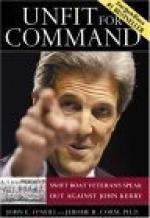|
This section contains 638 words (approx. 2 pages at 400 words per page) |

|
Unfit for Command Summary & Study Guide Description
Unfit for Command Summary & Study Guide includes comprehensive information and analysis to help you understand the book. This study guide contains the following sections:
This detailed literature summary also contains Topics for Discussion and a Free Quiz on Unfit for Command by Jerome Corsi.
The 185 pages of Unfit for Command detail John Kerry's service in Vietnam as the commander of a Patrol Craft Swift (PCF), or "Swift Boat," as well as his post-Vietnam activities as a leader of the anti-war movement. The book's perspective is through the eyes of the men with whom he served. With rare exception, his comrades-in-arms view the Democratic nominee for President of the United States as a coward, liar, opportunist, and war criminal. They claim Kerry designed his military service and post-service activities for the self-stated purpose of creating a legend of falsehoods that would provide a platform for Kerry to later run for President. The authors state that their sole purpose for writing Unfit for Command was to expose John Kerry as unqualified to command the nation's military. The Democrats, of course, denied both the intent and substance of the book; claiming it was a smear tactic of the George W. Bush campaign.
Section 1 of Unfit covers Kerry's enlistment in the U.S. Naval Reserve in February 1966. Kerry had requested a deferment from the draft board to do post-graduate work in Paris after his graduation from Yale, but was denied. In the spring of that year, Kerry delivered an anti-war speech at Yale.
Between August and December of 1966, Kerry attended Officer Candidate School and graduated as an Ensign on active status. Between June of 1967 and June of 1968, Kerry served on board the U.S.S. Gridley, a Guided Missile Frigate that patrolled off the coast of California and Australia. Gridley spent five weeks well off the coast of Vietnam. Later, Kerry would claim this service as one of two tours of duty he "volunteered" to serve in Vietnam. However, a "tour" in Vietnam consisted of at least one year in-country. Kerry's first tour never got closer to in-country than one mile offshore, and his second "tour" lasted only four months; one of which he spent in training in a former French beach resort location.
Kerry claimed his first Purple Heart medal for an injury his fellow "Swiftees" say was accidental but self-inflicted from a rocket-propelled grenade that Kerry fired. The medic who treated the wound described it as a "Band-Aid and tweezers affair," removing a one-centimeter piece of shrapnel. The authors claim Kerry's other two Purple Hearts were of similar severity, and were granted solely on the basis of Kerry's after-action reports. These reports, according to the authors, describe enemy hostilities that none of the other participants recall. The authors detail an incident in particular in which Kerry's boat fired on an innocent Sampan, killing a small child. Kerry disguised this in his report as one enemy dead. They also charge him with inventing a fleeing group of Vietcong in that incident. Kerry's Silver and Bronze Star Medals come under fire as well and are claimed to be similarly bogus.
In Section 2, O'Neill recounts his outrage at Kerry's testimony before the Senate Select Committee on Foreign Affairs, chaired by outspoken anti-war Senator Fulbright. The committee was charged with exploring possible scenarios for a U.S. withdrawal from Vietnam. It was before this committee on April 22, 1971 that Kerry made his now famousand debunkedcharges of intentional war crimes committed with the full complicity of the entire chain of command of the U.S. Military. Author O'Neill wrote to the Fulbright Committee prior to Kerry's testimony asking to be heard, but the committee responded that they had no room for another speaker. Incensed by Kerry's testimony, O'Neill eventually took on Kerry in a one-on-one debate on the Dick Cavett Show. Kerry could not substantiate his charges, and by all accounts plainly lost the debate. In the book, the authors continue to detail Kerry's political career, which changed with public opinion from war-protester to war-hero based on what they claim is a false record.
Read more from the Study Guide
|
This section contains 638 words (approx. 2 pages at 400 words per page) |

|



